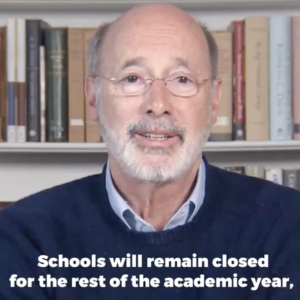Pennsylvania Gov. Tom Wolf closed all schools in the state for the remainder of the 2019-2020 academic year as the government continues to grapple with the daily fallout of the coronavirus pandemic.
The news may not be a surprise for parents in the Delaware Valley, but is stressful nonetheless for those in a region that has seen the highest number of coronavirus cases in the state since the pandemic began to emerge in Pennsylvania in early March.
The Pennsylvania Department of Health said Thursday the state has 18,228 confirmed cases of coronavirus. In the southeast region, Philadelphia County has 5,029 cases; Bucks County 871; Montgomery County 1,693; Delaware 1,222; and Chester County 425.
Wolf’s order applies to all private and public K-12 schools. Colleges and universities might be able to reopen but only with the governor’s permission.
The commonwealth now joins a growing list of states that have closed schools for the remainder of the academic year, according to the Washington Post: Alabama, Arizona, California, Georgia, Indiana, Kansas, Michigan, New Mexico, Nebraska, Oklahoma, Virginia and Vermont.
Wolf said reaching the decision was difficult but emphasized it does not mean all learning has been stopped.
“Although schools are closed, teaching and learning may continue: schools are strongly encouraged to provide continuity of education for all students in the most appropriate and accessible ways possible,” a news release on the governor’s website said.
“[Pennsylvania Department of Education] has secured resources intended to help all schools that want to use them — including those not currently offering online platforms, those requiring additional technology support, and those that may rely on traditional methods, such as paper lessons, to continue educating students. There is no cost to schools or students for these resources.”
The release also said schools could begin summer work “on the day after their academic year ends.”
School districts have been scrambling to adjust to the new reality since the initial closure began on March 13. The School District of Philadelphia, for example, approved $11 million to purchase roughly 50,000 laptops for students. Another 15,000 were purchased for charter and parochial students of need in the Philadelphia area funded by donations from the Jump-Start Philly Schools Fund.
“If there is a silver lining in this, it is that, through the generosity of local individuals and businesses, the District has been able to equip our students with resources that will allow them to participate in remote learning programming,” SDP superintendent Dr. William R. Hite, Jr., said in a news release.
The Pennsylvania State Educators Association (PSEA) said it appreciated the hard work of the governor and his team.
“PSEA will continue to offer information and support to our members as they work diligently to deliver instruction remotely while school buildings remain closed,” Chris Lilienthal, assistant director of communications for the PSEA, told Delaware Valley Journal.
Beyond the loss of days in the classroom this year, one educator noted that extra time may be needed as a consequence when school resumes for students who receive special education services.
“We realize recuperation of skills may take some time and we remain dedicated to working diligently with your child, both now within the confines of distance learning, and in the future when we are back with your children in our schools,” said John J. Kopicki, superintendent for the Central Bucks School District.
Brian Hayden, CEO of the Pennsylvania Cyber Charter School — with approximately 10,500 students statewide — said he felt the governor made the right call. Cyber charter schools do most of their educating online, although they do maintain some meeting places around the state for athletic, social and musical activities.
Hayden told Delaware Valley Journal that the school has seen a slight but noticeable increase in enrollment since February, most of which he attributes to coronavirus fears. But there has also been a tide in the other direction as events have unfolded, especially after Wolf made the initial closure of schools on March 13.
“It was interesting, once traditional schools started to provide some continuity of education [after the initial closure], we were getting calls by families that said, ‘You know what? We’re happy to just stay in our community school.’ And they withdrew their enrollment. So I don’t think there will be a huge surge in our enrollment. I think it will be steady.”
On social media, reaction from parents and students was mostly dour, although some students were reacting with a tinge of delight.
On a Facebook page for Middetown Township in Delaware County, a parent said, “So sad… my son really wants to get back to the school environment, activity and his friends. The online learning is hard for him. And I’m so sad for all of our seniors!”
One Twitter user seemed to easily sum up the disappointment felt not just at the cancellation of the school year, but also the myriad activities that go along with it.
“Schools in Pennsylvania have officially been closed for the rest of the year so um ….. if anybody needs a prom dress lemme know,” she tweeted.

